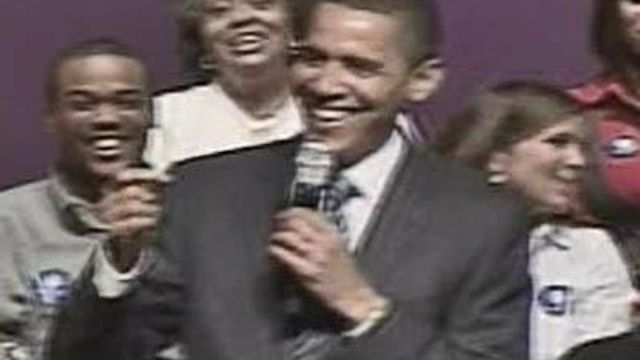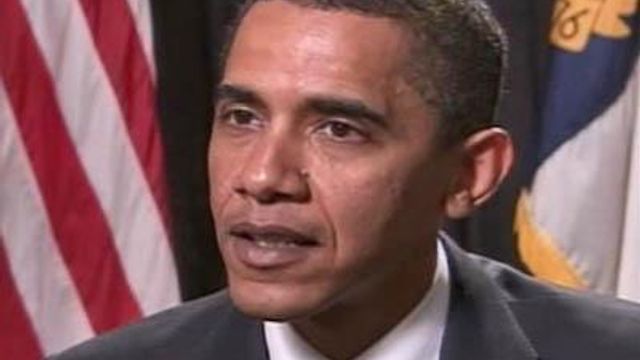Obama: America Can't Wait for Change
Democratic presidential candidate Sen. Barack Obama discussed the economy, education, health care and the Iraq War during a town hall-style meeting in Greensboro Wednesday.
Posted — Updated"We're at a defining moment in our history," Obama told a packed house at the Greensboro Memorial Coliseum. "We can't wait to fix our schools. We can't wait to fix our health-care system. We can't wait to bring good jobs and wages back to the United States of America. We can't wait to bring the war in Iraq to an end."
Believing the best change occurs from the bottom up, he said, he wants to bring American people together to overcome special interests in Washington.
"The biggest problem we have right now is that Washington doesn't hear people," he said. "(Special interests) are the ones who are writing the laws. They're the ones hiring the high-priced lobbyists."
Obama called for rewarding top teachers, giving college tuition credits in exchange for community service, subsidizing health care for people currently uninsured, ending the Iraq War and implementing a more strategic foreign policy.
"If you're ready for change, if you're willing to work with me, we can shake things up," he said.
In response to a question from a Bosnian woman about immigration, Obama called for beefing up border security and cracking down on employers who hire illegal immigrants. But he said the U.S. can't reasonably try to round up millions of undocumented workers.
"You have to give them a pathway to gain citizenship," he said, noting that he would require them to pay a penalty for breaking the law and would make them wait for others who entered the country legally to become citizens.
Obama told a man who asked about the economy that he doesn't have "a silver bullet" to help those struggling with debt and job losses. But he said a combination of policies, from universal health care to improved education and training, should help millions of people.
"In a nation as wealthy as this, there shouldn't be deeply impoverished people," he said.
He blasted Sen. John McCain, the presumptive Republican nominee for president, for a lack of vision in dealing with the nation's economic problems. McCain has adopted a "sit back and watch it happen" approach to the downturn in the economy, Obama said.
"He offered not one policy, not one idea, not one bit of relief," Obama said. "We've been down this road before. It's the road that George Bush has taken over the last eight years. It's the idea that the government has no role at all in solving the challenges of working families."
Obama also addressed the recent controversy involving his former pastor, the Rev. Jeremiah Wright, who has been criticized in recent weeks for statements criticizing U.S. race relations. Obama said Wright was wrong in making the statements but said it was unfair for 30 years of preaching to be boiled down into a 30-second sound bite, which he said distracts everyone from solving more serious problems in the country.
"We cannot solve the problems of America if, every time someone somewhere says something stupid, that everybody gets up in arms, and we forget about the war in Iraq or we forget about the economy or we forget about the things that are going to make a difference in our children's lives," he said.
The discussion of Wright came in response to a question from a Christian college student about Obama's faith and his policies. The candidate responded that he believes in "a gospel of not just words, but deeds" and tries to shape his policies to "apply Jesus' teachings in a concrete way."
"I believe in doing right here on Earth," he said.
Those in attendance said they were impressed with Obama and his message.
"I think he's good for the country. I think he gives a positive, positive message," one man said.
"He's a unifier," another man said.
The Greensboro appearance marked Obama's second trip to North Carolina in a week. Last week, he campaigned in Fayetteville and Charlotte, calling for an end to the Iraq War and speaking on issues from health care to the economy.
His main rival for the Democratic nomination, Sen. Hillary Rodham Clinton of New York , plans to stop in Raleigh, Fayetteville and Winston-Salem on Thursday.
Her husband, former President Bill Clinton, made stops in Cary and Charlotte last week and plans to visit Greensboro, High Point, Kannapolis, Salisbury and Hickory on Friday.
Chelsea Clinton, the Clintons' daughter, also is scheduled to appear at the North Carolina Young Democrats convention on Saturday.
In the close race for the Democratic nomination, North Carolina's 134 delegates are important.
"North Carolina, in some ways, captures what's happening around the country," Obama said in an exclusive interview with WRAL. "I do believe that, if we can do well here in North Carolina, we're starting to get to the point where it's really going to be hard for Sen. Clinton to win the nomination."
“This whole thing could come down to what you’ll decide to do in North Carolina,” Hillary Clinton said.
She is scheduled to talk about the economy during a speech at Wake Technical Community College in Raleigh. She’ll then lay out "Solutions for America" at Terry Sanford High School in Fayetteville.
Rob Christensen, a political columnist with The News & Observer newspaper, said presidential candidates have not given North Carolina this much attention in 20 years.
“They’ve watched Iowa, New Hampshire, even South Carolina pick nominees where North Carolina had no say. Now, they have a very big say,” Christensen said.
• Credits
Copyright 2024 by Capitol Broadcasting Company. All rights reserved. This material may not be published, broadcast, rewritten or redistributed.






